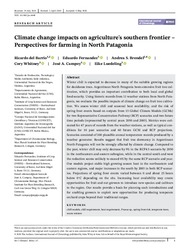Climate change impacts on agriculture's southern frontier – Perspectives for farming in North Patagonia
DOI: https://doi.org/10.1002/joc.6649
Persistent URL: http://resolver.sub.uni-goettingen.de/purl?gldocs-11858/9095
Persistent URL: http://resolver.sub.uni-goettingen.de/purl?gldocs-11858/9095
del Barrio, Ricardo; Fernandez, Eduardo; Brendel, Andrea S.; Whitney, Cory; Campoy, José A.; Luedeling, Eike, 2020: Climate change impacts on agriculture's southern frontier – Perspectives for farming in North Patagonia. In: International Journal of Climatology, DOI: 10.1002/joc.6649.
 |
Dokument öffnen: |
Winter chill is expected to decrease in many of the suitable growing regions for deciduous trees. Argentinean North Patagonia hosts extensive fruit tree cultivation, which provides an important contribution to both local and global food security. Using historic records from 11 weather stations from North Patagonia, we evaluate the possible impacts of climate change on fruit tree cultivation. We assess winter chill and seasonal heat availability, and the risk of spring frost events based on outputs from 15 Global Climate Models (GCMs) for two Representative Concentration Pathway (RCP) scenarios and two future time periods (represented by central years 2050 and 2085). Metrics were estimated for 47 years of records from the weather stations, as well as typical conditions for 10 past scenarios and 60 future GCM and RCP projections. Scenarios consisted of 100 plausible annual temperature records produced by a weather generator. Results suggest that fruit tree dormancy in Argentinean North Patagonia will not be strongly affected by climate change. Compared to the past, winter chill may only decrease by 9% in the RCP4.5 scenario by 2050 in the northeastern and eastern subregion, while in the central-south and west the reduction seems unlikely to exceed 6% by the same RCP scenario and year. Our models project stable high growing season heat in the northeastern and eastern regions, and major increases in the south by 2085 in both RCP scenarios. Projections of spring frost events varied between 0 and about 25 hours below 0°C depending on the site. Increasing heat availability may create opportunities for fruit and nut growers to introduce new species and cultivars to the region. Our results provide a basis for planning such introductions and for enabling growers to exploit new opportunities for producing temperate orchard crops beyond their traditional ranges.
Statistik:
ZugriffsstatistikSammlung:
Schlagworte:
chill modelschill requirement
heat requirement
Prunus sp.
spring frost risk
temperate trees
warm winters
This is an open access article under the terms of the Creative Commons Attribution-NonCommercial-NoDerivs License, which permits use and distribution in any medium, provided the original work is properly cited, the use is non-commercial and no modifications or adaptations are made.

